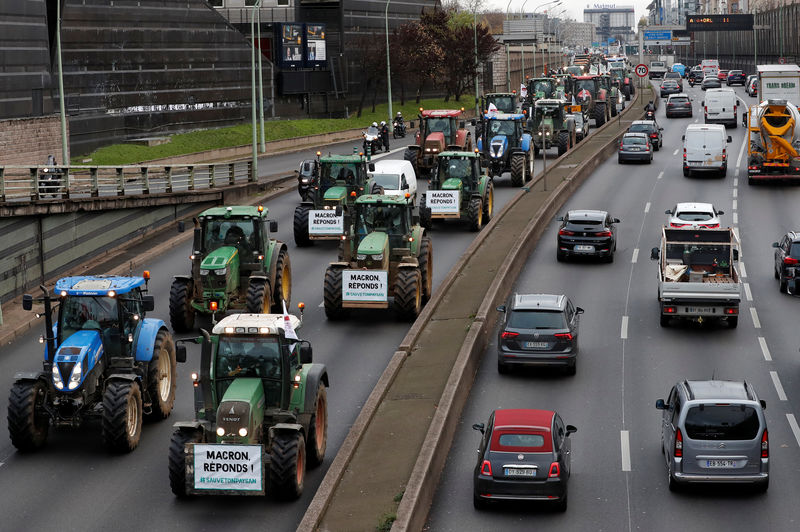By Thierry Chiarello and Lucien Libert
PARIS (Reuters) - Hundreds of French farmers angered by international trade deals and government policy drove tractors along the main highways into Paris on Wednesday, blocking commuter traffic and adding to the social unrest facing President Emmanuel Macron.
On the A1 autoroute, an artery that links the capital to the north of France and its ports, one group temporarily blocked three lanes of traffic.
"No rural France without farmers. Let us get on with our jobs," one farmer wrote on his tractor.
Another in a convoy flanked by police motorcyclists took aim at the president: "Macron, answer us! Save farmers."
Farmers unions said their members would converge on Avenue Foch, a wide boulevard flanked by some of Paris' most luxurious properties near the Arc de Triomphe in central Paris.
The two main farm unions are staging the protest and demanding a meeting with President Emmanuel Macron to express grievances over policies they say hurt French agriculture, such as the phasing out of the weedkiller glyphosate.
"We want to warn everyone that if there are no more farmers in France it has a knock on effect on the French economy," 29-year-old farmer Alix Heurtaut told Reuters ahead of the protest.
AGRI-BASHING
Macron, 41, faces growing discontent against his social and economic reform agenda across French society.
His government last week announced emergency financing in a failed attempt to head off further hospital strikes and has been locked in negotiations with unions this week over pension reform ahead of nationwide transport strikes on Dec. 5th.
Resentment among farmers has been growing at what they call "agri-bashing", or criticism of agriculture over issues ranging from pesticide use to animal welfare.
Attacks on livestock farms and butcher's shops by vegan activists have caused particular outrage. Longstanding tensions with environmental associations have meanwhile deepened amid debates about banning glyphosate and restricting pesticide use near residential areas.
Farmers widely blame Macron for rushing to ban glyphosate by 2021, going beyond current European Union policy, although the government has promised exemptions for farms that have no viable alternative.
Macron has also been under pressure from farmers over EU trade deals with Canada and the Mercosur bloc of South American countries, which farming groups say will usher in imports of cheaper agricultural goods produced to lower standards.
A food law passed by Macron's government, which aimed to give farmers a fairer share of profits, has failed to dispel discontent over modest revenues.
France is the largest agricultural producer in the EU and the biggest beneficiary of subsidies under the EU's Common Agricultural Policy.

Farm unions are gearing up for negotiations over the next EU budget, which could see agricultural spending trimmed due to Britain's planned exit from the bloc.